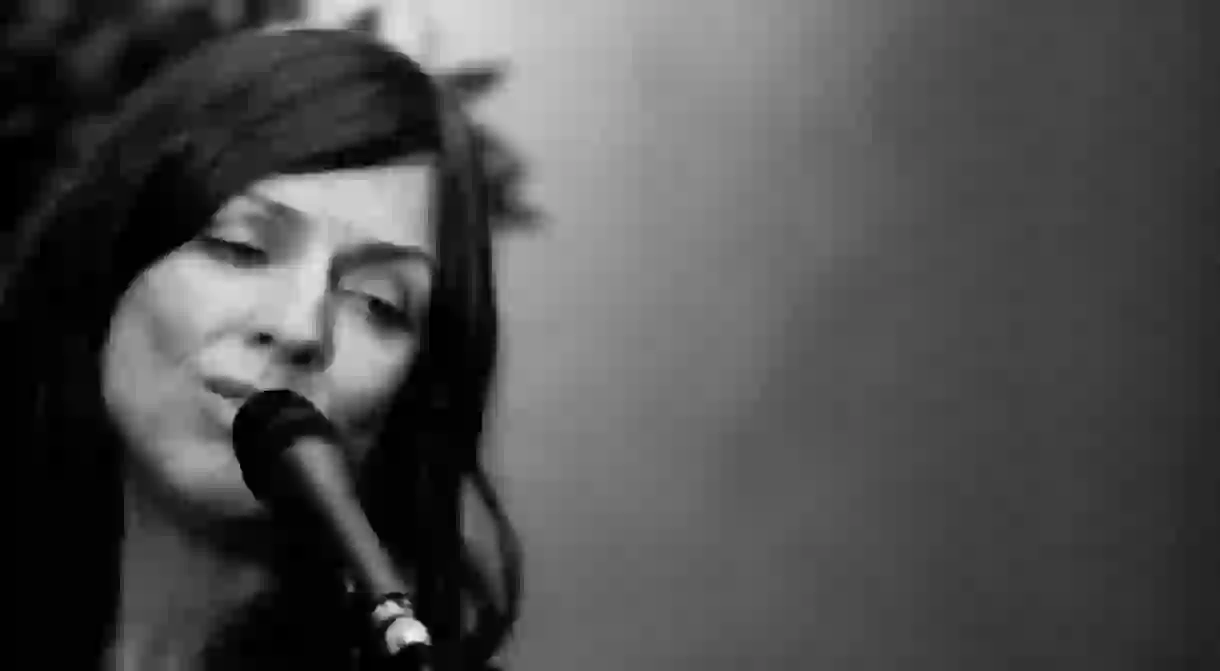The Improvised Life Of Ulrike Haller, Jazz Singer From Berlin

On the evening of August 22, 2015, Ulrike Haller was standing on the 18th-century stage of ‘Chateau de l’Enclos‘ in the serene village of Geer, Province of Liege, Belgium for her phenomenal jazz and soul performance. That summer evening, she arrived in Belgium to share with music lovers not only her soulful vocals and inspiring energy but also her thoughts on life, arts, traveling and the relationship between ‘the improvised and the planned.’ By that point, Mrs. Haller, living in Berlin, a mother of a successful musician, is arguably one of the most miraculous jazz singers of Germany.

Childhood with the Singing Father
Ulrike Haller was born and raised in the village of Dorff, near Aachen, in Germany. Since early childhood, she remembers her father always singing. ‘He knew hundreds of songs by heart, with all the verses, and when I finally started listening to ‘Earth, Wind and Fire,’ and Stevie Wonder and [I] sang along, he didn’t like it. He said that I had no voice – that I was screaming not singing. Of course, after that I didn’t try to sing for a while,’ remembers Ulrike with a smile.
‘One should want only one thing and want it constantly,’ André Gide once observed. One thing Ulrike wanted more than anything else was to sing; therefore, after getting a degree in languages, she decided to pursue a career on the stage. She started collaborating with different Sinti Jazz musicians, also known as gypsy jazz, in her hometown of Aachen. ‘Music to me is everything: my love, my lover, my goddess to whom I pray (music is female to me), without it I would definitely be lost or somehow really crazy. Music is more important than anything else. It defines who I am. It gives me the same joy sometimes like it is when you are freshly in love.’

The first song she wrote was only because Sinti musicians had too many instrumentals, and Ulrike was getting bored touring and having only four songs to sing. As a result, she created lyrics to Django Reinhardt’s songs, such as ‘Lentement, Mademoiselle.’
Later, Ulrike also wrote lyrics to dozen of songs by Lulo Reinhardt, the grand nephew of jazz legend Django Reinhardt. ‘All these compositions were based on personal experiences – things that happened to me at the time and how I felt about them.’
Singing Lessons with a Demanding Russian Teacher
Tenacity in Ulrike proved to be the seedbed of her artistic victories. As a young lady, she had been taught conventional classical singing and could have made a career in a music hall. But it became her mission to elevate singing into a language of transformation, to make it an instrument for big emotions, thoughts and reflections. ‘I owe a lot to my vocal teacher Maria Miranova, a talented Russian professor living and teaching in Belgium; she was always honest with me, very honest! I would sing ‘A’ forever, on different intervals and arpeggios, and it was never good, my A…After two years, I finally did a note that impressed her and she gave me props saying: ‘That was good.’ I was driving home, tears of joy running down my face – I was thinking: ‘I can sing, I can finally do a perfect A…’.’
Talking about ‘improvisation vs. planning,’ Ulrike admits that in life and in music some things have to be well planned. ‘But I never plan what I’m going to eat tomorrow, things like that. I like improvisation where it is appropriate. In music, you can only improvise when you are already on a certain level of musicianship. I love it. I love to freestyle to some nice chord progression; we wrote lots of songs like that with the trio I used to work with, just free-styling, and then beautiful pieces came out of it.’
For many years, Ulrike has lived in Berlin (in the area of Görlitzer Park in Kreuzberg) and is more than happy about it. ‘Berlin is the city where craziness of any kind is tolerated and welcome. I would also like to try out New York one day. I visited it once for a longer period of time and loved it. But when I am old, I would prefer to live with my best friend at a place where it doesn’t get really cold – Madeira, for example.’
Ulrike is a natural mover and reserves of obsessive energy. For inspiration she listens to jazz singers like Dinah Washington, Billie Holiday, Sarah Vaughn, then Donny Hathaway, Stevie Wonder, Whitney, Mariah, Brandy, Chaka Khan, Amy Winehouse, Jazmine Sullivan, Faith Evans and Prince.
Traveling is Singing Poetry
She also finds traveling as a catalyst for artistic insights. ‘I usually don’t travel for the sake of traveling; I travel to visit someone or to work, so I don’t have some fancy holiday stories to offer. I have traveled to Belgium, to Chateau de l’Enclos today, more than 500 kilometers to sing and to share with you my thoughts. I would probably never come here just as a tourist. Vacation to me is boring; I don’t enjoy tourism. If I could choose a destination for fun, it would be a very quiet place with people I know. I have a friend in Cyprus, his mother lives in the mountains in a very small village, that is something I guess I would enjoy as a vacation. I don’t get sightseeing, taking pictures, visiting famous places – all of it gives me back pain. What interests me is to see how people live in different parts of the globe, how their everyday life is arranged and what they feel about it. Traveling for me is singing poetry – the spontaneous overflow of feelings, dancing in the air of new tastes and habits, touching the sky of another culture, inhaling the vibrations of unfamiliar languages.’













